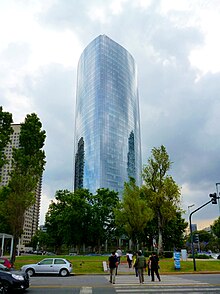 | |
 Repsol-YPF Tower in Puerto Madero, 2010 | |
| Company type | Sociedad Anónima |
|---|---|
| BCBA: YPFD NYSE: YPF MERVAL component | |
| Industry | Petroleum and natural gas |
| Founded | June 3, 1922 [1] |
| Founder | Government of Argentina (Hipólito Yrigoyen's administration) [2] |
| Headquarters | , |
Area served | Argentina |
Key people | Horacio Daniel Marín (president) |
| Products | Petroleum Natural gas Petrochemicals |
| Services | Fuel stations LNG transportation Oil refining |
| Revenue | |
| Total assets | US$25.9 billion (2022)[3] |
| Owner | Government of Argentina (51%) |
Number of employees | 23,471[3] |
| Parent | Secretary of Energy |
| Website | ypf.com |
YPF S.A. (Spanish pronunciation: ['i 'pe 'efe],[4] formerly Yacimientos Petrolíferos Fiscales; English: "Fiscal Oilfields") is a vertically integrated, majority state-owned Argentine energy company, engaged in oil and gas exploration and production, and the transportation, refining, and marketing of gas and petroleum products. In the 2020 Forbes Global 2000, YPF was ranked as the 1360th -largest public company in the world.[5]
Founded in 1922 under President Hipólito Yrigoyen's administration, YPF was the first oil company established as a state enterprise outside of the Soviet Union, and the first state oil company to become vertically integrated.[6][7]
YPF's first director was Enrique Mosconi, who took up his charge in 1922, remaining there until 1930.[8] During his run on the company, Mosconi advocated economic independence and starting in 1928, nationalization of oil supplies; the latter, however, was never achieved due to a 1930 military coup against Yrigoyen backed by, among others, foreign oil interests.[9]
YPF was privatized under president Carlos Menem and was bought by the Spanish firm Repsol in 1999; the resulting merged company was called Repsol YPF.
The renationalization of 51% of the firm was initiated in 2012 by President Cristina Fernández de Kirchner.[10] The government of Argentina eventually agreed to pay $5 billion compensation to Repsol.[11]
According to Bloomberg, the board of directors include Matteo Reggio and Miguel Gutiérrez.
- ^ La creación de YPF y el desarrollo del modelo "mosconiano" (1922-1930) by Daniel Marques, Agencia Paco Urondo, 29 March 2013
- ^ Historia y futuro de YPF on YPF website
- ^ a b c d "YPF S.A. Form 20F 2022" (PDF). YPF. pp. 68–69.
- ^ "Nuestras dificultades para identificar a YPF y su propio derrotero". Nova Nacional (in Spanish). Puerto Madero. 6 March 2012. Archived from the original on 17 May 2012. Retrieved 3 January 2022.
- ^ "Forbes Global 2000". Forbes. Retrieved 31 October 2020.
- ^ Miguel Angel Patiño (13 April 2012). "Repsol necesita que Kirchner valore YPF en 8.200 millones para evitar minusvalías". Expansión.
- ^ "YPF, parte de nuestra historia". YPF.
- ^ Quién era y qué pensaba el fundador de YPF by on Página/12, 3 May 2012
- ^ Wirth, John (2001). The Oil Business in Latin America. Beard Books. ISBN 1587981033.
- ^ Hilary Burke & Helen Popper (17 April 2012). "Argentina moves to seize control of Repsol's YPF". Reuters.
- ^ "Spain's Repsol agrees to $5 billion settlement with Argentina over YPF". Reuters. 25 February 2014. Retrieved 19 June 2015.